Even…
I’m feeling prickly today. Poetry, I think, is what’s called for.
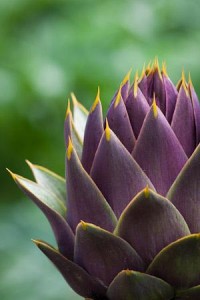 My Species
My Species
by Jane Hirschfield
even
a small purple artichoke
boiled
in its own bittered
and darkening
waters
grows tender,
grows tender and sweet
patience, I think,
my species
keep testing the spiny leaves
the spiny heart
It’s Better to Know
 This from Mindfulness: A Practical Guide to Awakening, by Joseph Goldstein, which our KM Book Group will be discussing tonight:
This from Mindfulness: A Practical Guide to Awakening, by Joseph Goldstein, which our KM Book Group will be discussing tonight:
“Without an understanding of what is skillful and what is unskillful, we end up doing a lot of things that either don’t bring their promised results or actually bring harm to others and ourselves. This, in turn, leads to doubt and confusion about what we’re doing in our practice and our lives.
“For this reason, there is the counterintuitive teaching that it is better to do an unskillful act knowing that it is unskillful than to do it without that knowledge. If we go ahead and do that act, even as we know that it’s unskillful, there are still the seeds of wisdom that can lead to future restraint.” (p. 168)
Should be a lively discussion!
Maybe Just One More
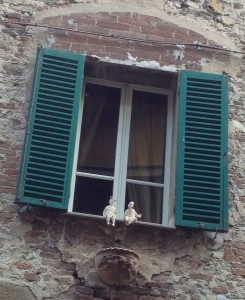 One more photo from Italy. This one I would have missed if not for a fellow traveler, who stopped and pointed, and so I looked up.
One more photo from Italy. This one I would have missed if not for a fellow traveler, who stopped and pointed, and so I looked up.
What other delights, I wonder, have I missed?
The Awakened
How joyful to look upon the awakened
And to keep company with the wise.
Follow then the shining ones,
The wise, the awakened, the loving,
For they know how to work and forbear.
But if you cannot find
Friend or master to go with you,
Travel on alone–
Like a king who has given away his kingdom,
Like an elephant in the forest.
If the traveler can find
A virtuous and wise companion
Let her go with them joyfully
And overcome the dangers of the way.
Follow them
As the moon follows the path of the stars.
— from the Dhammapada, translated by Thomas Byron (pronoun edits by me)
One More
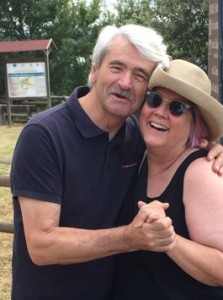 One more poem from Mary Oliver…this one titled: Wild, Wild.
One more poem from Mary Oliver…this one titled: Wild, Wild.
And one more photo from Italy…this one of me and Alfeo, the owner of Le Santucce, who spoke to me always in Italian, and always with kindness, humor, and joyful affection.
Wild, Wild
This is what love is:
the dry rose bush the gardener, in his pruning, missed
suddenly bursts into bloom.
A madness of delight; and obsession.
A holy gift, certainly.
But often, alas, improbable.
Why couldn’t Romeo have settled for someone else?
Why couldn’t Tristan and Isolde have refuse
the shining cup
which would have left peaceful the whole kingdom?
Wild sings the bird of the heart in the forests
of our lives.
Over and over Faust, standing in the garden, doesn’t know
anything that’s going to happen, he only sees
the face of Marguerite, which is irresistible.
And wild, wild sings the bird.
***
I love Alfeo! (Love is always wild. Even when it’s not romantic.)
It Works Even When It Doesn’t
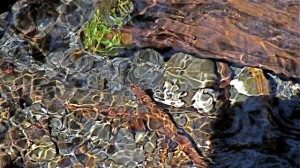 For today, I’d like to share a bit of practice reassurance by Gil Fronsdal, from his sweet little collection of essays titled, The Issue at Hand. (Download a free copy here.)
For today, I’d like to share a bit of practice reassurance by Gil Fronsdal, from his sweet little collection of essays titled, The Issue at Hand. (Download a free copy here.)
“In practicing mindfulness, it can be helpful to remember that the practice works even when it doesn’t seem to work. Perhaps this is explained best through an analogy.
“Consider a mountain stream where the water is quite clear, and seems placid and still. But if you place a stick into the water, a small wake around the stick shows that in fact the water is flowing. The stick becomes a reference point that helps us notice the movement of the water.
“Similarly, the practice of mindfulness is a reference point for noticing aspects of our lives that we may have missed. This is especially true for mindfulness of breathing. In trying to stay present for the breath, you may become aware of the concerns and momentum of the mind that pull the attention away from the breath. If you can remain with the breath, then obviously mindfulness of breathing is working. However, if your attempt to stay with the breath results in increased awareness of what pulls you way from the breath, then the practice is also working.
“Without the reference of mindfulness practice, it is quite easy to remain unaware of the preoccupations, tensions, and momentum operating in your life. For example, if you are busily doing many things, the concern for getting things done can blind you to the tension building in the body and mind. Only stopping to be mindful may you become aware of the tensions and feelings that are present….
“Remember, if we learn from what is going on, regardless of what is happening, the practice is working, even when it seems not to be working, when we aren’t able to stay with the breath….
“And when we ARE settled on the breath, then the heart becomes clear, peaceful, and still like a mountain pool. Then we can see all the way to the bottom.”
We All Want to Be Happy
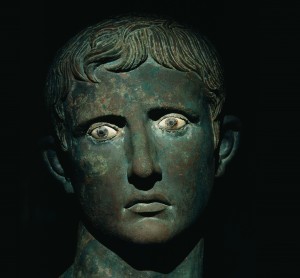 I’m thinking about what I want to talk about at the next Sunday Sangha. There have been a lot of new people coming — many brand new to meditation — so I thought I might start with this passage from Mindfulness in Plain English, by Bhante Gunaratana:
I’m thinking about what I want to talk about at the next Sunday Sangha. There have been a lot of new people coming — many brand new to meditation — so I thought I might start with this passage from Mindfulness in Plain English, by Bhante Gunaratana:
“Happiness and peace are really the prime issues in human existence…
“So what is this happiness? For most of us, the idea of perfect happiness would be to have everything we wanted and be in control of everything, playing Caesar, making the whole world dance a jig according to our every whim. Once again, it does not work that way.
“Take a look at the people in history who have actually held this type of power. They were not happy people. Certainly, they were not at peace with themselves. Why not? Because they were driven to control the world totally and absolutely and they could not…. These powerful people could not control the stars. They still got sick. They still had to die.
“You can’t ever get everything you want. It is impossible. Luckily, there is another option. You can learn to control your mind, to step outside of the endless cycle of desire and aversion.”
***
And how do you do that?
By meditating.
And how does that work?
Stop in at Sunday Sangha and find out!
(“Sunday Sangha” is a Mindfulness Meditation Sitting Group that meets every Sunday, 11:00 am to 12:30 pm, at 7700 Clayton Road, Suite 319.)
Me and Not Me
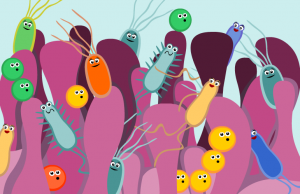 Time for a little poetry…but I’ll give Mary Oliver a rest. For today:
Time for a little poetry…but I’ll give Mary Oliver a rest. For today:
My Proteins
by Jane Hirshfield
The have discovered, they say,
the protein of itch–
natriuretic polypeptide b–
and that it travels its own distinct pathway
inside my spine.
As do pain, pleasure, and heat.
A body it seems is a highway,
a cloverleaf crossing
well built, well traversed.
Some of my going north, some going south.
Ninety percent of my cells, they have discovered,
are not my own person,
they are other beings inside me.
As ninety-six percent of my life in not my life.
Yet I, they say, am they–
my bacteria and yeasts,
my father and mother,
grandparents, lovers,
my drivers talking on cell phones,
my subways and bridges,
my thieves, my police
who chase my self night and day.
My proteins, apparently also me,
fold the shirts.
I find in this crowded metropolis
a quiet corner,
where I build of not-me Lego blocks
a bench,
pigeons, a sandwich
of rye bread, mustard, and cheese.
It is me and is not,
the hunger
that makes the sandwich good.
It is not me then is,
the sandwich–
a mystery neither of us
can fold, unfold, or consume.
To Drink or Not to Drink
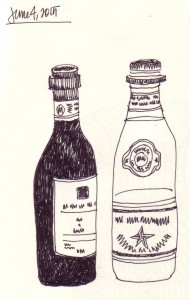 I seldom drink wine any more. It’s expensive, for one thing. Plus, I take the Buddhist precepts seriously….which, in their basic form, are trainings to avoid killing, stealing, lying, sexual misconduct, and “the use of intoxicants that cloud the mind.”
I seldom drink wine any more. It’s expensive, for one thing. Plus, I take the Buddhist precepts seriously….which, in their basic form, are trainings to avoid killing, stealing, lying, sexual misconduct, and “the use of intoxicants that cloud the mind.”
This is not a hardship for me…usually. But there I was in Italy. With ubiquitous and delicious — and inexpensive — wine…grown locally, developed over centuries to complement perfectly the local cuisine.
There was water, too, of course. Excellent Italian mineral water. (San Pelligrino, usually, but other brands as well.) Which I love. Especially the frizzante!
But water, alone, with all those great Italian meals!?!
I couldn’t do it.
Of course I could have. But I didn’t. At most meals, I drank the wine. (And the water.)
I told myself that I was still keeping the precept because I wasn’t drinking more than a glass or two, and always with food…surely that was not enough to cloud my mind…and besides, the precepts are not hard-and-fast rules, especially not the one about “avoiding intoxicants,”….and there are plenty of Dharma teachers (some of whom I’ve witnessed personally) who drink wine (and maybe indulge in other intoxicants, too, who knows!)…but the truth is, I could feel the difference, my mind was a little cloudy after a glass or two…it was nothing major, of course, not enough to cloud my judgment about not killing or stealing or lying or having unprotected sex with inappropriate partners!!!…but still.
I’m not saying that it was wrong for me to drink the wine. I’m not even saying that I won’t do it again. Because in certain situations, under certain circumstances, I will.
But I am aware of the risks of a mind that is clouded.
And I will take care.
(The above is one of the drawings I did while I was in Castiglion Fiornetino. I had intended to do one every day…but, as is clear, I do not always do the things that I intend.)
Enjoy.
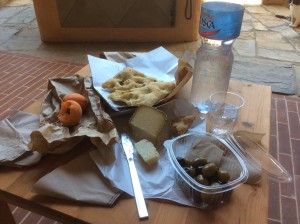 For today, I offer this photo of my typical “carry out” lunch while I was in Italy. I don’t have a lot to say about this Dharma-wise…except maybe to quote the “Venerable” Michael Pollan:
For today, I offer this photo of my typical “carry out” lunch while I was in Italy. I don’t have a lot to say about this Dharma-wise…except maybe to quote the “Venerable” Michael Pollan:
Eat Food.
Mostly Plants.
Not Too Much.
Reading about Wanting
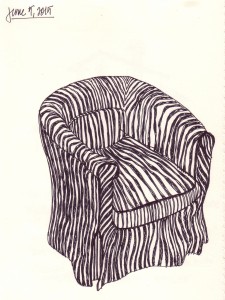 Here is a drawing I made of the chair in my room in Castiglion Fiorentino, where I sat to read the book I’d brought for literary inspiration: The Folded Clock, by Heidi Julavits. I thought I’d be inspired because it got rave reviews in the New York Times, and because the structure of the book is both mundane (it’s a diary) and yet it’s not (there’s no discernible order). Each entry starts with a date, which seems to have no chronological connection to the entry before, and with a sentence that begins, “Today…”
Here is a drawing I made of the chair in my room in Castiglion Fiorentino, where I sat to read the book I’d brought for literary inspiration: The Folded Clock, by Heidi Julavits. I thought I’d be inspired because it got rave reviews in the New York Times, and because the structure of the book is both mundane (it’s a diary) and yet it’s not (there’s no discernible order). Each entry starts with a date, which seems to have no chronological connection to the entry before, and with a sentence that begins, “Today…”
For example:
May 5. Today I met for lunch a famous German artist, the one who violates the homes of others with her personal possessions.
August 30: Today we climbed Blue Hill.
June 8. Today I flew home from Italy after living for a month with a ghost.
So you can see, this is no ordinary diary.
From a literary point of view, it was very inspiring. From a personal point of view, it was mostly disheartening.
On August 16, she writes about wanting. The entry begins: Today I browsed for skirt suits online. She ends with a beautifully written riff on wanting, which I think captures something of the delusion that keeps her (and others) forever looking for SOMETHING, always anxious, unsettled, and unhappy:
“I recalled being a kid and my mom taking me to a plant nursery called Skillins. I hated Skillins. As a child I was gifted at finding objects to desire. To take me to basically any store was to court my begging for items I had no business wanting. It was desire for the sake of desire. The plant nursery, however, confounded my meta-desire mechanism. I tried and tried, but I could never find a single thing to desire at Skillins, not even in the room with the ceramic frog planters. I didn’t want anything, and because I didn’t want anything, Skillins made me anxious. In Skillins I experienced what it was to desperately want to want something, and to find nothing to want. Even as a kid, this struck me as the worst possible way to feel. I sometimes think this is why I became a writer. Here was a way to regularly exercise my desire. I could desire to do this thing that no one does perfectly, and by doing it and doing it I could learn how to desire more, and better. Here was an activity that would always leave me wanting. When I want something–that to me is not youth exactly, but the opposite of death. That to me is a way to always feel like I am nowhere near the end.”
